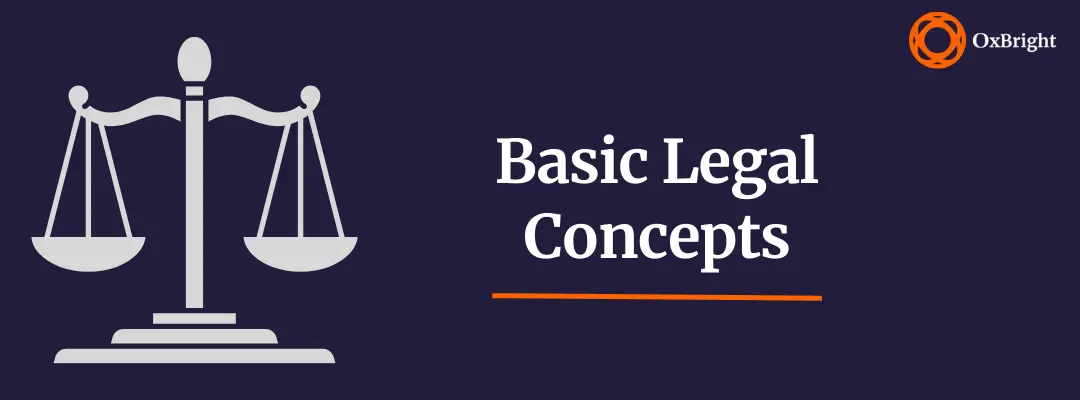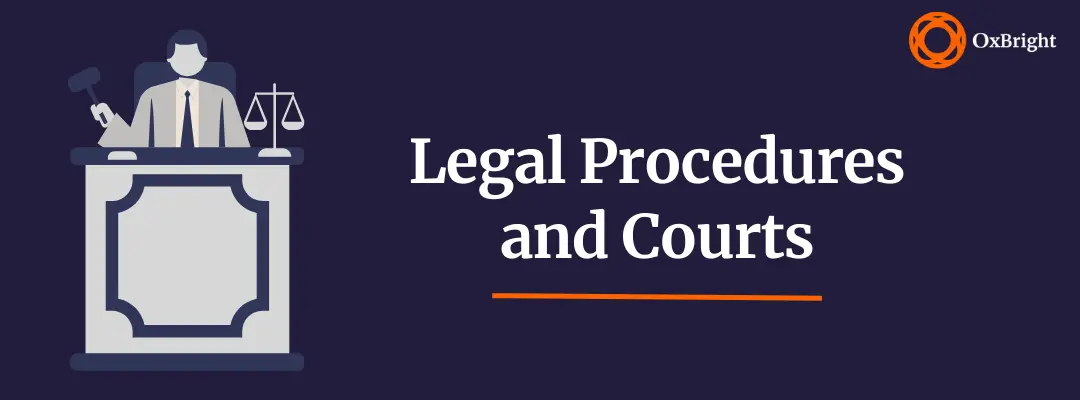Legal Terminology Made Simple: A High School Student’s Guide

If you’re thinking of studying Law at university or pursuing a legal career in the future, it’s an excellent idea to get to grips with some basic legal terminology. Not only does it make understanding the subject a whole lot easier, but it also helps to impress university admissions tutors and boost your applications.
What Is Legal Terminology?
Legal terminology is a specialised vocabulary used across the legal profession. Certain concepts are very particular to law, so there are a variety of words that can feel unfamiliar to someone outside of the legal field.
Lawyers have good reason to be specific about language; clear, unambiguous communication is crucial to legal systems. Law is often about binding promises, and by requiring specific legal terminology to be used, we are more likely to know for sure whether we have made a promise that the law can hold us to, and on what terms.
Fundamentally, law creates rights and obligations (more about that below!), so it’s important to understand exactly what we are entitled to, what we are obliged to do, why, and under which circumstances. Specific legal terminology helps us navigate this often tricky system, and understanding legal terminology makes it much more accessible.
Why Should High School Students Learn Legal Terminology?
A strong foundation in legal terminology can be a real advantage to high school students pursuing a legal career, for a variety of reasons. Some of these include:
I. Empowerment in legal matters
We engage with the law every day, in ways we don’t necessarily realise – buying a coffee is a legal vendor-purchaser contract, for example!
Understanding legal terminology equips you with the knowledge and vocabulary to navigate legal situations with confidence, giving you an edge both as a legal professional and a private individual. This enables you to comprehend legal documents, contracts and rights, which can be invaluable in various real-life situations, from renting an apartment to understanding legal responsibilities.
II. Enhanced critical thinking
Learning legal terminology also promotes critical thinking and analytical skills. An understanding of legal terminology allows you to appreciate the pillars and nuances of a legal system, by focusing on important concepts deemed central to law.
Studying legal terminology encourages you to dissect complex legal issues, evaluate arguments, and make informed decisions, fostering a thoughtful and logical approach to problem-solving.
In order to think like a lawyer – which requires strong critical thinking – it’s helpful to speak like one, but only if you understand the words you’re using!
III. Improved communication and advocacy skills
A foundational knowledge of legal terminology enhances your ability to articulate your thoughts and ideas clearly. This is highly valuable, regardless of whether or not you pursue a legal career; the ability to express an argument convincingly will help you to succeed, no matter your field of study or profession.
Learning legal terminology equips you with the tools to advocate for yourself and others effectively, whether in discussions on social justice, during debates or within a future legal career. To advocate for yourself and others is a privilege that ought to be used to better your community.

IV. Preparation for future careers
Exposure to legal terminology at an early stage can prepare you for potential careers in law, criminal justice, paralegal studies or related fields. It lays a strong foundation for further academic and professional opportunities in the legal industry.
As with any field of study, it can be hard to get your head around the theory before you’re able to fully understand the specialised jargon. Learning legal terminology will put you in a stronger starting position if you’re considering Law at university, and if you’d like to engage with the law professionally.
If you’re interested in pursuing a legal career, check out our online Law internships for students for some hands-on experience!
How Do I Learn Legal Terminology?
It’s not uncommon to feel anxious or unsure about learning a lot of new terminology. Indeed, it can be difficult to learn so many terms, but there are tried and tested methods to make the terminology stick.
Any Law student will attest that regular practice is both inevitable and extremely effective – but how you practise is up to you!
Flashcards and mind maps might be best if you’re a visual learner, and quizzes, mnemonics and acronyms are also great for absorbing new information. It can also be helpful to gather a group of aspiring Law students to explore legal terminology together – asking questions and indulging your curiosity is bound to help you get to grips with the terminology.
Key Legal Terms for High School Students
Without further ado, let’s get into some key legal terms!
General legal terminology
Basic Legal Concepts
Justice. The term “justice” is probably familiar to you – it’s the idea of a fair outcome. In the legal sense, it requires that those who apply and enforce the law do so impartially.
Rights. Rights are powers or privileges which we’re legally entitled to, and therefore can have enforced in a court of law. Some rights are automatic and held by a large group of people, such as fundamental human rights or rights of free movement if you’re a European Union citizen. Some rights arise as a result of the deliberate actions of individuals, and are held by a specific few in specific circumstances. For example, an individual’s breach of a contract may give the other contracting party the right to terminate the contract.
Due process. Due process is the requirement that the state follows a set of rules when enforcing the law. For example, if the state is going to imprison somebody, it must follow all the procedural rules that empower the state to imprison someone. If they don’t, then they have not applied the law correctly. Due process exists to protect the individual from the power that the state wields through the law; it means that the state’s power is not unlimited.
Common law. In English law, laws can stem from two sources: 1) statute or 2) the decisions of judges in court cases. The latter group forms the “common law”.
Presumption of innocence. This is the general legal rule that everyone is innocent until proven guilty. It’s important to note that when there’s a presumption in favour of something, it does not need to be proven. In fact, the burden is on the other party to prove the opposite. If the other party cannot prove the presumption wrong, the presumption stands.
Equality before the law. This term means that everyone is equally subject to the law, whether it’s offering protection or prescribing punishment. The Universal Declaration of Human Rights – a United Nations General Assembly resolution – sums up the idea of equality before the law in the following words: “All are equal before the law and are entitled without any discrimination to equal protection of the law”.
Rule of law. The exact definition of the “rule of law” is fiercely debated. However, most agree that it describes the ideal state of affairs which occurs when a legal system operates fairly, openly and impartially. It is a standard which most governments try to meet.
Burden of proof. To have the “burden of proof” is to say that a judge will not take your assertion for granted unless you can prove it. In a court case, it’s a disadvantage to have the burden of proof as it presents more obstacles to your case.
Legal Documents and Contracts
Contract. A contract can be defined as an agreement that creates rights and obligations between parties which can be legally enforced. An example of a contract is a vendor-purchaser contract, where one party promises to provide goods in exchange for money, and the other party promises to pay money in exchange for the goods. In English law, there are five requirements in order for a contract to be formed: 1) offer and acceptance, 2) certainty of terms, 3) consideration, 4) correct format and 5) intention to create legal relations.
Agreement. An agreement is the meeting of two or more minds on a given matter.
Offer and acceptance. Offer and acceptance are two crucial elements of a contract. Where party A makes an offer to party B, for example to sell B a car for £10,000, and B accepts this offer, for example by sending an email saying that they want to buy the car for £10,000, the first stage of forming a contract has been completed.
Counteroffer. Sometimes an offer is not met by an acceptance. It might instead be met by a counteroffer – a new offer given instead of the original. In order for this counteroffer to give rise to a contract, it must be accepted on its own terms, and agreed on by all parties.
Breach of contract. A breach of contract is when a party to the contract fails to comply with one of the terms of the contract. The purpose of a contract is to render a promise legally enforceable, so when the “promise” is not upheld, there can be serious legal consequences. An example of a breach might be failure to perform a service within the agreed time frame.
Consideration. Consideration is required for a contract to be formed under English law. Consideration is some act or thing that the promisee (the one who promises) gives as the “price of the promise”. Consideration is important because it acts as a speed bump in contract formation. Without the requirement of consideration, you could easily find yourself party to a legally binding agreement which you were unaware of.
Statute of limitations. A statute of limitations is a piece of legislation which lays out a set period in which you can bring a legal action against another individual.
Force majeure clause. A force majeure clause is a clause in a contract which explains that the parties are no longer bound to their promises in the event of some unpredictable and extraordinary occurrence.
Mediation. Mediation is the involvement of a third party in a legal dispute whose role is to regulate the dispute and help find a solution.
Legal Rights and Responsibilities
Freedom of speech. Freedom of speech is the legal right to express yourself without being censored or punished by the state.
Right to privacy. The right to privacy is a fundamental human right, protecting everyone from state intrusion concerning personal and family matters.
Right to a fair trial. Everyone is entitled to a fair trial before legal action is taken against them by the state. A fair trial is one conducted in line with procedural rules, and by an impartial judge. This right is enshrined in multiple places, such as Article 6 of the European Convention of Human Rights.
Voting rights. Voting rights are those rights that entitle you to participate in public elections.
Jury duty. This a legal obligation to appear as a member of a court jury in order to help decide the outcome of a criminal case. Jury duty kicks in when you receive a summons, which is the name of the letter you’re sent.
Age of consent. The age of consent is the age at which an individual is deemed able to validly consent to sexual activities. This age varies between jurisdictions.
Age of criminal responsibility. The age of criminal responsibility is the age at which an individual is deemed able to have committed a crime. If you’re below this age, you cannot be held legally responsible for the crime, even if you carried out the act.
Legal Procedures and Courts
Trial. A trial is the legal procedure where disputing parties argue their individual cases before a judge, with the goal of reaching a binding decision on the legal issue in dispute.
Verdict. A verdict is the decision of a judge or court, and concludes a trial.
Judge. A judge is an individual who has been granted the power to make binding decisions in legal disputes in court.
Jury. A jury is a group of individuals who partake in a trial. Their role is to help decide questions of fact about the case before them.
Appeals. To appeal is to take the trial decision of a lower court to a higher court, in order to try for a different outcome.
Subpoena duces tecum. A subpoena duces tecum is a legal document requiring a person or a piece of evidence to appear before the court.
Pro bono. This refers to legal services which are provided by legal professionals voluntarily, i.e. for free.
Perjury. Perjury is the act of lying under oath before a court.
Contempt of court. Contempt of court is a crime. It involves committing acts which disrupt or disrespect the functioning and authority of the court.
Specialised legal terminology
Criminal Law
Felony. A felony is a crime that’s considered serious, and may carry repercussions such as imprisonment.
Misdemeanour. A misdemeanour is a crime that’s considered less serious than a felony. Punishments for misdemeanours are also less strict.
Defendant. A defendant is someone who has been accused of a crime, or against whom some civil action is being brought.
Prosecutor. A prosecutor is a state official whose goal is to ensure the defendant in a criminal case faces legal consequences for whatever they’ve been accused of.
Evidence. Evidence is material or oral proof backing up a claim in a legal dispute.
Homicide. Homicide is the crime of killing a human being.
White-collar crime. White-collar crime is the concept of a crime committed by business people or those in high-positions, which is non-violent and financially-driven. For example, tax fraud.
Plea bargain. This is an agreement in criminal law proceedings between the prosecutor and defendant, which may reduce the punishment received by the defendant in exchange for the defendant admitting guilt.
Recidivism. This is what we call the phenomenon of convicted criminals reoffending.
Civil Law
Plaintiff. A plaintiff is someone who brings legal action in court against someone else.
Tort. A tort is a civil (not criminal) wrong. They are acts which are not criminal but are still against the law. For example, the tort of negligence, which means breaching a duty of care.
Damages. Damages are monetary compensation one would receive if they won a civil law action. When you sue someone, you are suing for damages.
Lawsuit. A lawsuit is an action brought against someone else to a court of law. A lawsuit claims that someone has broken the law, and thereby caused damage to the party bringing the lawsuit. A lawsuit typically involves a demand for restitution.
Settlement. A settlement is a resolution reached between disputing parties in a legal case.
Class action. A class action is a lawsuit brought by an individual on behalf of a larger group.
Injunction. This is a type of court order which requires a person to either do something or stop doing something.
Constitutional Law
Constitution. A constitution is the collection of laws, rules and customs which are the bedrock of a state. Some constitutions are written, like the US Constitution, and others are unwritten, like the UK’s.
Bill of Rights. A Bill of Rights is a document stating the fundamental rights held by all people under its jurisdiction, which the state cannot interfere with.
Amendments. These typically refer to official changes made to a Constitution.
Civil liberties. These refer to certain individual freedoms protected by law.
Judicial review. Judicial review is the procedure by which a court of law reviews and scrutinises the actions of the executive government, ensuring that they are legal and within the powers granted to the government by the law.
Checks and balances. Checks and balances means the idea of ensuring that the powers of various organisations are kept in check and balanced out by the scrutiny of another body. It’s a way of ensuring that no single body of the state is too powerful.
Family Law
Custody. Custody refers to the legal right and responsibility to care for a minor. This is typically held by one or more parents.
Guardianship. Guardianship occurs when the legal responsibility for a minor is held by someone other than that minor’s parent.
Divorce. Divorce is the legal termination of a marriage.
Alimony. Alimony is what we call the financial support which a court might order one spouse to provide the other when carrying out a divorce.
Child support. Child support is the financial support which the court orders to be paid by the parent who is not the primary caregiver or custodian of the child, to the parent who is. This applies to separated parents.
Emancipation. Emancipation is the process by which a minor can escape the legal authority of their parents. It essentially breaks legal ties between a child under 18 and their parents.
Prenuptial agreement. This is a contract which two people can enter into before marrying, where they can agree to customise and change the legal rights which they would otherwise gain upon marriage.
Annulment. An annulment is another way of legally ending a marriage. However, an annulment has the effect that, legally, the marriage never existed. This is different from divorce, which terminates an existing marriage.
We hope that you’ve found this guide a useful introduction to legal terminology.
Learning legal terminology might seem like a daunting task, but with consistent practice and effective techniques, you’ll soon be confidently versed in legal matters well beyond high-school level.
For an aspiring Law student, it’s never too early to start absorbing this technical vocabulary, and give yourself an extra boost to your legal journey!

By Lisa Muttonen
Lisa Muttonen worked as a Head of House at Oxford Scholastica Academy’s summer school in 2023. She recently completed a BA in Jurisprudence and French Law at the University of Oxford. Her interests lie in feminist legal theory, particularly in the international law context, and she hopes to pursue a career applying her skills and education to the international women’s aid effort. Lisa currently lives and works in Copenhagen, Denmark, with a view to undertaking a Master’s there in International Relations.
Recommended articles
OxBright Tutors Share Their Top Tips for High School Graduates
Finishing high school can be a really intimidating juncture – you’re leaving the security of a routine you’ve followed for five plus years, and you’re faced with more options and less structure than ever before. Oh, and your decisions now can shape your future in a...
Which Career Is the Best Fit for Me?
Choosing your career path is one of the first big steps you’ll take as a young adult, so it can often be a daunting prospect. However, the possibilities are endless, and as long as you base your choices on your personal preferences, passions and interests, your...
How to Make a Study Schedule That Actually Works
Studying can sometimes feel like a daunting task, no matter how old you are or what level you’re studying at. You might be left thinking: How can I balance academics with my other commitments? How do I stay consistent with a study schedule? Is there a “good” or...











